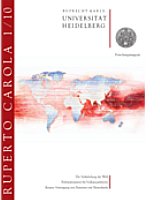Ruperto Carola 1/10: Telegrams from the Bowels of the Earth
Heidelberg scientists devise early-warning system for volcanic eruptions
First-hand knowledge: New issue of Heidelberg University’s research magazine now out
 Volcanic eruptions are among the most spectacular natural phenomena our planet has to offer. Though astoundingly beautiful to behold, they also pose major hazards to human life and the environment. The power of nature became apparent in spring of this year, when clouds of ash from the relatively small Icelandic volcano Eyjafjallajökull brought air traffic over Europe grinding to a halt for several days. At Heidelberg University’s Institute of Environmental Physics scientists have devised remote sensing methods for measuring volcanic gases at a safe distance from the crater, thus predicting volcanic eruptions and saving lives. In the new issue of the “Ruperto Carola” research magazine, Dr. Christoph Kern and Prof. Dr. Ulrich Platt give an account of the exciting work they are engaged in.
Volcanic eruptions are among the most spectacular natural phenomena our planet has to offer. Though astoundingly beautiful to behold, they also pose major hazards to human life and the environment. The power of nature became apparent in spring of this year, when clouds of ash from the relatively small Icelandic volcano Eyjafjallajökull brought air traffic over Europe grinding to a halt for several days. At Heidelberg University’s Institute of Environmental Physics scientists have devised remote sensing methods for measuring volcanic gases at a safe distance from the crater, thus predicting volcanic eruptions and saving lives. In the new issue of the “Ruperto Carola” research magazine, Dr. Christoph Kern and Prof. Dr. Ulrich Platt give an account of the exciting work they are engaged in.
The significant extent to which Heidelberg scientists have contributed to our understanding of how stars evolve and the universe develops is described by Prof. Dr. Andreas Quirrenbach of the Centre for Astronomy in his article “Big Eyes, Deep Views”. The Observatory at Königstuhl has been part of the University since 2005. Its staff design and build high-performance spectrographs for the world’s biggest telescopes, enabling them to look deep into the universe and make some astonishing discoveries in the process.
The “Cabling of the World” is the subject of the next article from historian Dr. Roland Wenzlhuemer of Heidelberg University’s Cluster of Excellence “Asia and Europe in a Global Context”. The author gives a graphic account of the way in which telegraphy “dematerialised” communication in the second half of the 19th century and for the first time decoupled the flow of information from human movement. By the turn of the century, telegraph cables spanned the entire globe, rapidly becoming an engine of globalisation.
Better care for patients with kidney tumours is the aim of the research group headed by Prof. Dr. Markus Hohenfellner at Heidelberg University’s Urological Hospital. The urological tumour database maintained there has been in place for 18 years, making it the oldest in Germany. It has played a key role in promoting therapeutic progress in this field, including minimally invasive and conservative kidney surgery. The research team’s current work has initiated new approaches to the treatment of patients with kidney tumours by demonstrating how cancer cells can be driven to programmed cell death, also known as apoptosis.
Further topics in the new issue
“History Fever”
The museum boom and memorial sites like the Holocaust monument in Berlin testify to a growing interest in the past. Prof. Dr. Jonas Grethlein of Heidelberg University’s Department of Classical Languages and Literature takes an incisive look at this new awareness and reports on remarkable differences in historical thinking in antiquity and the modern world.
“Influencing the Climate?”
In an interview, Prof. Dr. Timo Goeschl of the Alfred Weber Institute of Economics outlines the “Climate Engineering” project in which researchers from various fields of inquiry examine the question of whether everything that is technically feasible is also desirable.
“Winning by Cheating”
Prof. Dr. Burkhard Hess of the Institute of Foreign and International Private and Economic Law explains what can be done to put a stop to the Google Book Search. Google intends to make the holdings of the world’s most important libraries accessible online - a fascinating project indeed. But it has one huge drawback: only the libraries have been asked for their consent, not the authors or publishers.
“New Ideas and Greater Flexibility”
are called for by Prof. Dr. Heinz-Dietrich Löwe, Dean of the Faculty of Philosophy, to deal with the current issues besetting Bachelor and Master courses of study.
“Ruperto Carola” is Heidelberg University’s research magazine. Three times a year, outstanding scholars and scientists present their research work to the interested public and offer their readers a broad range of topics and “first-hand knowledge”.
The current issue can be obtained from the Communications and Marketing Department, Press Office, Grabengasse 1, D-69117 Heidelberg, phone: +49 6221 542311.

